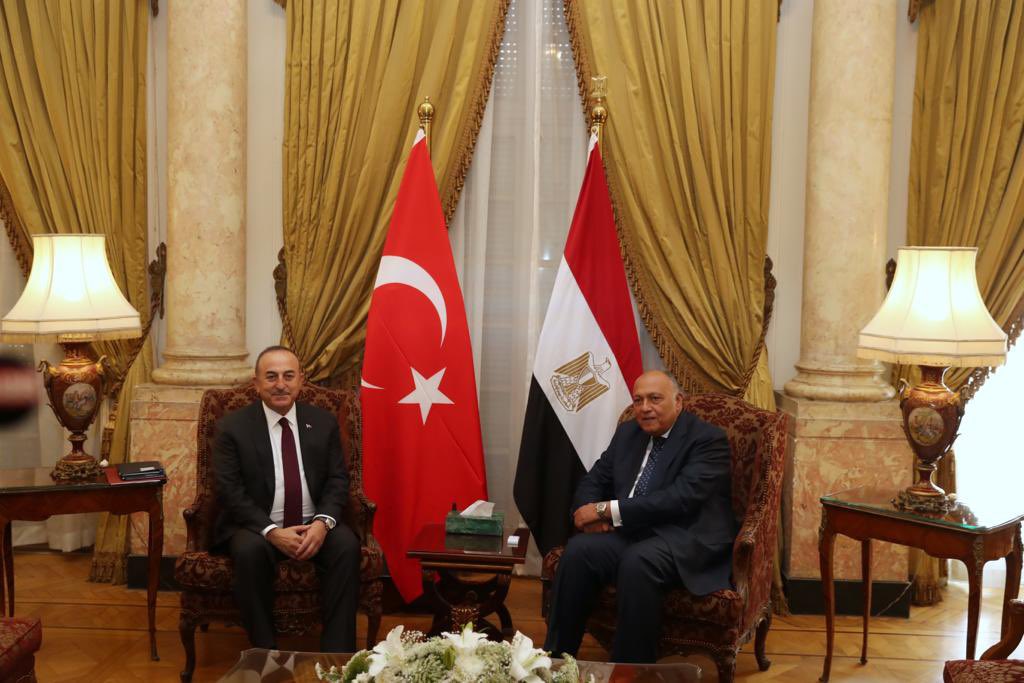Turkey and Egypt have agreed to “maximize” diplomatic relations and “work together for the stability of Libya,” Turkish Foreign Minister Mevlüt Çavuşoğlu told reporters in remarks published by Turkish media outlets on Monday.
This comes following his landmark visit over the weekend to Cairo where he met with his Egyptian counterpart Sameh Shoukry to discuss bilateral relations as well as regional and international issues on Saturday.
Çavuşoğlu said they have discussed ways to develop bilateral relations and “discussed existing matters, issues to overcome.”
“We exchanged views, especially on regional issues. Then we held a meeting between delegations and discussed everything. In other words, we touched on all matters from energy, shipping, transportation to our companies, and investments here,” he said, adding that topics related to energy, logistics, education, and culture were also addressed.
Talks on Libya
The two chief diplomats discussed the situation in Libya “in a little more detail” during their encounter over the weekend. Despite backing different sides of the Libyan conflict, Turkey and Egypt agreed to “intensify” bilateral consultations and work together for the stability of Libya, according to Çavuşoğlu.
“We discussed Libya in a little more detail. We agree we are not rivals in Libya and that we should work together for the stability of Libya. We will intensify our consultations on this issue as well,” he noted.
The Turkish diplomat explained that his country’s deal with Libya over maritime authority areas was not against Egypt’s interests.
He said Egypt was initially disturbed by Türkiye’s presence in the region, but they affirmed that their presence did not pose a threat to Egypt.
On ties with Libya, Çavuşoğlu said Turkey was in touch with both sides of the political divide in Libya.
“We see Libya as a whole but it does not alter the fact that we only recognize the legitimate government in Libya. The most legitimate [foreign] presence in Libya is Turkey’s military presence,” he added.
Strained Relations
Ties between Turkey and Egypt were severely strained after Egypt’s then-army chief Abdel Fattah el-Sisi led the removal of Muslim Brotherhood’s Mohamed Morsi, an ally of Ankara, in 2013. El-Sisi was elected president the following year.
Turkey then provided refuge for members and leaders of the Muslim Brotherhood who fled Egypt after Sisi’s election and allowed them to operate and run satellite television channels that openly opposed Sisi’s government.
This tug of war between Cairo and Ankara was further heightened by regional conflicts. Egypt perceives Turkey’s active role in the region, which stretches from the Arabian Gulf to Libya, as a threat to its regional role and influence. This fact became clear after Turkey intervened in Libya and provided military support to Tripoli’s former Government of National Accord against the Libyan National Army (LNA), who is supported by Egypt since its backed by Libya’s democratically-elected parliament.
The exploration of energy sources in the Eastern Mediterranean added an additional stressor to already strained relations between Egypt and Turkey. Particularly significant was Egypt’s initiative to establish a regional forum that would include countries in the Mediterranean Sea that produce oil and gas.
In 2019, the East Mediterranean Gas Forum (EMGF) was officially launched, and included Turkey’s two main foes, Greece and Cyprus, as well as Jordan, Italy, and other East Mediterranean countries. However, Turkey was purposefully excluded from the EMGF.
In response, Turkey signed a maritime agreement with Libya’s Tripoli-based government to create an exclusive economic zone in the Mediterranean stretching from Turkey to Libya. The agreement would allow Turkey to interrupt the EMGF’s agenda, particularly a planned pipeline that would run from Israeli and Greek-Cypriot waters to Greece, and from there to the rest of Europe.
Cautious Rapprochement
After almost a decade of political tensions and diplomatic rupture, officials on both sides have begun to recognize the need to reset and improve their bilateral relations. In early 2021, Çavuşoğlu spoke of a new era of normalization with Egypt, starting with talks between senior officials from both countries, which were then achieved in reciprocal visits by Turkish and Egyptians delegations.
Since then, two rounds of talks have been held in Cairo and Ankara, where delegations from both countries met and discussed a range of issues, including how to move their relations forward. The first round of talks took place in May 2021, when a Turkish delegation of senior officials visited Egypt to mend strained relations with Cairo.
To back these rounds of talks, Turkey began to take concrete steps in order to repair its relationship with Egypt and rebuild mutual confidence. In April 2022, Istanbul-based, Muslim Brotherhood-affiliated satellite channel Mekameleen announced the closure of its offices and studios. This development, which was apparently a response to pressure from Turkish authorities, was welcomed by the Egyptian government, which had long complained about the anti-Egyptian government discourse the channel presented.
After this year’s earthquakes in Turkey, Shoukry visited the quake-hit Adana and Mersin provinces, and his visit to Turkey was the first by an Egyptian foreign minister in more than a decade. Meanwhile, Sisi was among the leaders who made a phone call with Turkish President Recep Tayyip Erdoğan following the earthquakes, offering his condolences to the quake victims.
Çavuşoğlu’s visit to Cairo two days ago is the first by a Turkish foreign minister in 11 years.
Diplomatic relations between Türkiye and Egypt have been at the level of charges d’affaires on both sides since 2013. However, during his remarks to reporters today, Çavuşoğlu signaled that both countries are in the process of appointing ambassadors.
The Turkish diplomat said it was previously planned that Erdoğan and Sisi would decide mutually on the matter.
“We were expecting the highest level of the announcement. If the [presidents’] meeting is delayed after the election [in Türkiye], we will consult again. We will decide on this soon. But we have already announced at the news conference that we have initiated this process,” he maintained.
